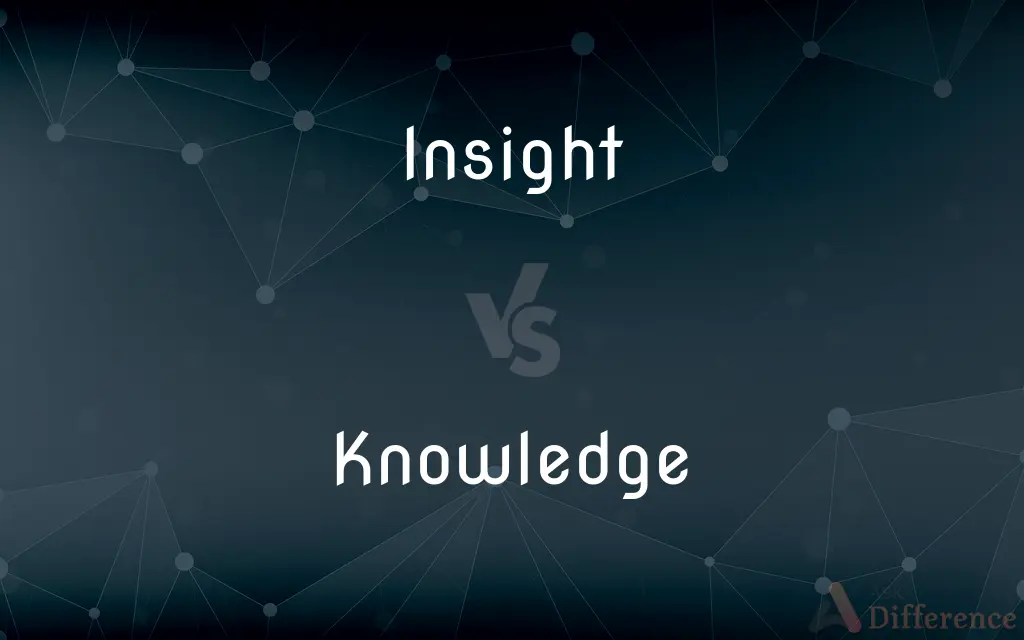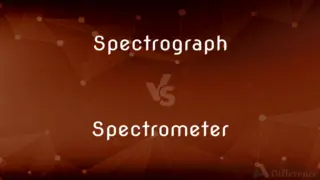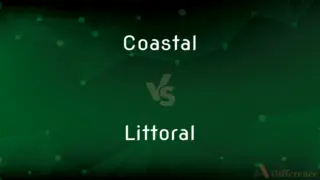Insight vs. Knowledge — What's the Difference?
By Tayyaba Rehman & Urooj Arif — Updated on April 16, 2024
Insight involves a deep understanding that facilitates problem-solving or innovation, often arising suddenly, while knowledge is accumulated information obtained through experience or education.

Difference Between Insight and Knowledge
Table of Contents
ADVERTISEMENT
Key Differences
Insight is the ability to grasp the inner nature of things or see intuitively the solution to problems, often described as an "aha" moment. Knowledge, on the other hand, consists of facts, information, and skills acquired through experience or education, forming a base from which insights can spring.
Knowledge is typically structured and can be quantified or documented, such as in books, databases, or educational curricula. Insights are more subjective and personal, often resulting from the unique synthesis of information in new, innovative ways. While knowledge can be taught, insights generally need to be discovered or realized by the individual.
In practical application, knowledge enables individuals to perform tasks, understand subjects, and make informed decisions based on past or learned experiences. Insight, however, allows for the creation of new methods, ideas, or connections that weren't previously apparent, often leading to breakthroughs in various fields.
The development of knowledge can be a gradual process, involving study, research, and accumulation of information. Insight might occur in a moment, often when least expected, as a sudden clarity about a complex situation or problem.
In a workplace setting, knowledge is what is often required and tested, while insights are highly valued for strategic decisions and innovations. For example, a manager might require knowledge of market trends and business principles, but rely on insight for launching a groundbreaking new product.
ADVERTISEMENT
Comparison Chart
Nature
Intuitive, often spontaneous
Accumulative, can be learned
Origin
Sudden understanding, synthesis of knowledge
Education, experience
Output
Innovations, solutions
Information, skills
Process
Sudden, often unexpected
Gradual, through learning
Application
Creating new methods, problem solving
Performing tasks, making decisions
Compare with Definitions
Insight
A deep understanding of a person or thing.
Her insights into human behavior helped solve the case.
Knowledge
Facts, information, and skills acquired through experience or education.
Her extensive knowledge of law secured her position at the firm.
Insight
Drives innovation and creative problem-solving.
The designer’s insight into fashion trends revolutionized the industry.
Knowledge
Can be theoretical or practical.
His knowledge of chemistry comes from years of study and lab work.
Insight
More about quality and depth of understanding.
His insight into the software’s architecture improved its efficiency.
Knowledge
Essential for informed decision-making.
Doctors rely on their medical knowledge to treat patients effectively.
Insight
The ability to discover creative or intuitive solutions.
His insight led to a new approach to sustainable energy.
Knowledge
Often quantified and tested.
Students' knowledge is often tested through exams and quizzes.
Insight
Often arises unexpectedly.
The scientist had an insight about the molecular structure while walking in the park.
Knowledge
Accumulated over time.
He accumulated a vast knowledge of world history over his career.
Insight
Insight is the understanding of a specific cause and effect within a particular context. The term insight can have several related meanings: a piece of information the act or result of understanding the inner nature of things or of seeing intuitively (called noesis in Greek) an introspection the power of acute observation and deduction, discernment, and perception, called intellection or noesis An understanding of cause and effect based on the identification of relationships and behaviors within a model, context, or scenario (see artificial intelligence)An insight that manifests itself suddenly, such as understanding how to solve a difficult problem, is sometimes called by the German word Aha-Erlebnis.
Knowledge
Knowledge is a familiarity, awareness, or understanding of someone or something, such as facts (descriptive knowledge), skills (procedural knowledge), or objects (acquaintance knowledge). By most accounts, knowledge can be acquired in many different ways and from many sources, including but not limited to perception, reason, memory, testimony, scientific inquiry, education, and practice.
Insight
The capacity to gain an accurate and deep understanding of someone or something
His mind soared to previously unattainable heights of insight
Knowledge
Facts, information, and skills acquired through experience or education; the theoretical or practical understanding of a subject
A thirst for knowledge
Her considerable knowledge of antiques
Insight
The ability to discern the true nature of a situation, especially by intuition.
Knowledge
Awareness or familiarity gained by experience of a fact or situation
The programme had been developed without his knowledge
He denied all knowledge of the incidents
Insight
A perception produced by this ability.
Knowledge
The state or fact of knowing
Humans naturally aspire to knowledge.
Insight
A sight or view of the interior of anything; a deep inspection or view; introspection; frequently used with into.
Knowledge
Familiarity, awareness, or understanding gained through experience or study
Has great knowledge of these parts.
Has only limited knowledge of chemistry.
Insight
Power of acute observation and deduction
Knowledge
The sum or range of what has been perceived, discovered, or learned
The extraordinary knowledge housed in the library.
Insight
(marketing) Knowledge (usually derived from consumer understanding) that a company applies in order to make a product or brand perform better and be more appealing to customers
Knowledge
(Archaic) Carnal knowledge.
Insight
Intuitive apprehension of the inner nature of a thing or things; intuition.
Knowledge
The fact of knowing about something; general understanding or familiarity with a subject, place, situation etc.
His knowledge of Iceland was limited to what he'd seen on the Travel Channel.
Insight
(artificial intelligence) An extended understanding of a subject resulting from identification of relationships and behaviors within a model, context, or scenario.
Knowledge
Awareness of a particular fact or situation; a state of having been informed or made aware of something.
Insight
(psychiatry) An individual's awareness of the nature and severity of one's mental illness.
Knowledge
Intellectual understanding; the state of appreciating truth or information.
Knowledge consists in recognizing the difference between good and bad decisions.
Insight
A sight or view of the interior of anything; a deep inspection or view; introspection; - frequently used with into.
He had an insight into almost all the secrets of state.
Knowledge
Familiarity or understanding of a particular skill, branch of learning etc.
Does your friend have any knowledge of hieroglyphs, perchance?
A secretary should have a good knowledge of shorthand.
Insight
Power of acute observation and deduction; penetration; discernment; perception.
Quickest insightIn all things that to greatest actions lead.
Knowledge
(philosophical) Justified true belief
Insight
Clear or deep perception of a situation
Knowledge
(obsolete) Information or intelligence about something; notice.
Insight
A feeling of understanding
Knowledge
The total of what is known; all information and products of learning.
His library contained the accumulated knowledge of the Greeks and Romans.
Insight
The clear (and often sudden) understanding of a complex situation
Knowledge
(countable) Something that can be known; a branch of learning; a piece of information; a science.
Insight
Grasping the inner nature of things intuitively
Knowledge
(obsolete) Acknowledgement.
Knowledge
(obsolete) Notice, awareness.
Knowledge
The deep familiarity with certain routes and places of interest required by taxicab drivers working in London, England.
Knowledge
(obsolete) To confess as true; to acknowledge.
Knowledge
The act or state of knowing; clear perception of fact, truth, or duty; certain apprehension; familiar cognizance; cognition.
Knowledge, which is the highest degree of the speculative faculties, consists in the perception of the truth of affirmative or negative propositions.
Knowledge
That which is or may be known; the object of an act of knowing; a cognition; - chiefly used in the plural.
There is a great difference in the delivery of the mathematics, which are the most abstracted of knowledges.
Knowledges is a term in frequent use by Bacon, and, though now obsolete, should be revived, as without it we are compelled to borrow "cognitions" to express its import.
To use a word of Bacon's, now unfortunately obsolete, we must determine the relative value of knowledges.
Knowledge
That which is gained and preserved by knowing; instruction; acquaintance; enlightenment; learning; scholarship; erudition.
Knowledge puffeth up, but charity edifieth.
Ignorance is the curse of God;Knowledge, the wing wherewith we fly to heaven.
Knowledge
That familiarity which is gained by actual experience; practical skill; as, a knowledge of life.
Shipmen that had knowledge of the sea.
Knowledge
Scope of information; cognizance; notice; as, it has not come to my knowledge.
Why have I found grace in thine eyes, that thou shouldst take knowledge of me?
Knowledge
To acknowledge.
Knowledge
The psychological result of perception and learning and reasoning
Common Curiosities
What is the key difference between insight and knowledge?
Insight is an intuitive understanding that often leads to new ideas, whereas knowledge is information gained through learning or experience.
How do insights affect decision-making?
Insights can lead to innovative decision-making by providing new perspectives that challenge conventional knowledge.
How does education contribute to insight?
Education increases knowledge, which is essential for insightful thinking by providing the necessary background from which insights can emerge.
How can one cultivate insights?
While insights can be spontaneous, fostering a broad base of knowledge and engaging in creative thinking can increase the likelihood of insights.
Can you have insights without knowledge?
Insights generally require some foundational knowledge, but the depth of knowledge required can vary widely.
Are insights always correct?
Not necessarily; insights need to be evaluated and tested, as they can sometimes lead to incorrect conclusions or assumptions.
Is insight more valuable than knowledge?
Both are valuable, but their importance varies depending on the context; insights can be crucial for breakthroughs, while knowledge is essential for foundational understanding and application.
How does culture influence insights and knowledge?
Cultural background can shape the approach to gaining knowledge and the types of insights that are encouraged or valued.
What role does knowledge play in professional development?
Knowledge is critical for competency and expertise in any profession, forming the basis upon which skills are applied and decisions are made.
Can knowledge hinder insight?
Sometimes, being overly focused on existing knowledge can prevent seeing beyond conventional thinking, potentially stifling insights.
How do insights manifest in scientific research?
In science, insights often lead to hypotheses and theories that advance understanding in ways that routine application of knowledge cannot.
Can insight be a skill?
Yes, the ability to gain insights can be developed as a skill, especially through practices that enhance observation, reflection, and creative thinking.
What is the impact of technology on knowledge and insights?
Technology can vastly expand access to knowledge and facilitate the generation of insights through data analysis and collaboration tools.
What techniques can enhance insight generation?
Techniques such as brainstorming, meditation, and interdisciplinary studies can foster conditions that enhance the generation of insights.
How do experts differ from novices in terms of insight?
Experts have a deeper reservoir of knowledge and experience, allowing them to make connections and gain insights that novices might not see.
Share Your Discovery

Previous Comparison
Spectrograph vs. Spectrometer
Next Comparison
Coastal vs. LittoralAuthor Spotlight
Written by
Tayyaba RehmanTayyaba Rehman is a distinguished writer, currently serving as a primary contributor to askdifference.com. As a researcher in semantics and etymology, Tayyaba's passion for the complexity of languages and their distinctions has found a perfect home on the platform. Tayyaba delves into the intricacies of language, distinguishing between commonly confused words and phrases, thereby providing clarity for readers worldwide.
Co-written by
Urooj ArifUrooj is a skilled content writer at Ask Difference, known for her exceptional ability to simplify complex topics into engaging and informative content. With a passion for research and a flair for clear, concise writing, she consistently delivers articles that resonate with our diverse audience.
















































